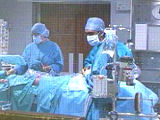FactCheck: Is this the 'best year ever' for the NHS?
Updated on 07 June 2006
Patricia Hewitt's memorable boast given the FactCheck treatment.

The Claim
"Despite the headlines, actually the NHS has just had its best year ever."
Patricia Hewitt, Health Secretary
BBC, 22 April 2002
Background
Patricia Hewitt has been on her feet in the commons today, announcing the size of the much talked-about NHS deficit and defending the government's record on health care.
So, just how big is that deficit, and does this disprove the claim she so memorably made in April, that "the NHS has had its best year ever"?
Analysis
The budget deficit is £512m. So it seems hard to believe, that when consultants are saying that the government's health policies are going 'very badly wrong', that the NHS is even close to its best year ever.
But there are many different ways to measure the performance of a massive organisation like the health service - and proving or disproving Ms Hewitt's famously controversial claim is much harder than it seems.
Since there has been so much attention paid to the deficit, it makes sense to look at financial yardsticks first. Patricia Hewitt announced an unaudited net deficit of £512m. When the accountants have finished looking at the books and signed them off, that figure could be higher or lower.
It's a huge sum, but in context it's not that great. It is still less than one per cent of the NHS's total budget (as Patricia Hewitt points out). The NHS has run bigger deficits in the past, and in some years it has finished with money to spare.
The problem is that it is spread unevenly. Some trusts overspend by much more than one per cent, and others underspend. If you add up the total deficts run up by all the trusts that are in the red, it comes to £1.227bn.
Some trusts are very seriously in the red - Norfolk, Cambridgeshire and North West London were mentioned as particularly bad examples. That's where the stories about cutbacks and redundancies are coming from.
But a trust which is in deficit could still be delivering excellent care. And vice versa. So how do you measure whether an NHS trust is doing well or not?
One way of assessing it would be to look at the targets that the Government has set itself. Patricia Hewitt has already admitted that 11 out of the 26 targets Labour set itself for 2008 are likely to be missed.
You could say that it's proof positive of organisational chaos, or just a consequence of Labour setting itself overly optimistic targets.
Look at it another way. The NHS does have more doctors and nurses than ever before. But their individual productivity has fallen.
Falling productivity doesn't sound like a good thing. But in recent years the NHS has been achieving high productivity by working its staff excessively hard.
One of the consequences of the government putting extra money into the Health Service is that fewer juniors are working the crazy hundred hour shifts they once did.
This means their measured productivity will fall, but those young doctors will be less sleepy when they take your temperature at three in the morning. But sleepiness is hard to measure. So it the quality of cancer care. So is the effect of programs to improve diet.
So what was Ms Hewitt thinking of when she made this claim? One thing is waiting lists. In the past, they've been one of the classic barometers of the health of the NHS. It's also been a very useful stick for opposition parties of all stripes to beat the government of the day.
With this in mind, perhaps, it's been one of the areas that Labour has focused on most keenly.
She said that the NHS has saved more lives than ever last year - a claim that merits a FactCheck all of its own.
Ms Hewitt also mentioned waiting lists. The queues of eldery patients immobilised in bed while they waited 18 months for a new hip made a graphic illustration of some of the problems the NHS has faced over the past decades.
It's also been a convenient stick with which parties of all colours could beat whoever happened to be in government.
So not surprisingly, Labour has focused on this particular area when it came to power. And they've made some progress.
The percentage of inpatients waiting more than 12 months has fallen from 30 per cent in 1980, to nearly zero. So in the waiting list area, there has been some success - as you would hope, since it has been the government's top priority since 1997.
But the historical comparison is more confusing. Look at the total numbers of people on waiting lists, for example. 1998 was the peak of the waiting list crisis, and things have improved since then.
But the latest figure, for 2004, wasn't even close to the lowest ever. Look back before 1989, and fewer people were waiting for operations that they are today.
Of course, medicine has changed since then. The population is larger, and older, and there are far more costly treatments they can receive.
So the figure's aren't directly comparable - and there is the problem with this claim. If you arrive in hospital with any given complaint today, you're much more likely to walk out alive than you would have
been back in 1947.
But that's mostly down to the improvements in medical science - new drugs, procedures and diagnostic techniques.
Verdict
So is this claim correct? Well, the jeering nurses at that conference in Bournemouth didn't think so. And while the NHS has made some significant steps forward, the evidence Patricia Hewitt puts forward isn't enough to justify such a bold claim as 'Best Ever'.
FactCheck Rating: 4
Sources
NHS 'Enjoying best year ever' - Hewitt, bbc.co.uk, 22 April 2006
'Deficits in the NHS', King's Fund, 7 June 2006
'The War on Waiting for Hospital Treatment', King's Fund, August 2005
Your view
You've read the article, now have your say. We want to know your experiences and your views. We also want to know if there are any claims you want given the FactCheck treatment. Email news@channel4.com
FactCheck will correct significant errors in a timely manner, Readers should direct their enquiries to the Editor at the email address above.



